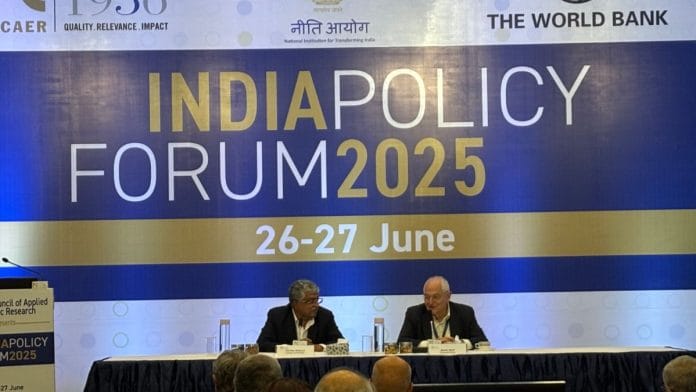New Delhi: The Financial Times’ chief economics commentator Martin Wolf said Thursday that Trumpism will endure even if Donald Trump is not in power.
“Trumpism refers to a blend of insecurity and grievance in the middle class due to de-industrialisation, racism, inequality, and a superpower rival. These forces will remain in the US public. And they won’t go away,” declared Wolf at the India Policy Forum lecture, India’s Role in the New World Disorder, which was held at the National Council of Applied Economic Research (NCAER) in New Delhi.
The arrival of Trump as president for a second time is more than just a transformative moment for the United States, said Wolf. “Because of the role of the US in the world since the 1930s, it’s bound to be a transformative moment for the world.”
In his hour-long lecture, Wolf talked about the second coming of Donald Trump, its economic consequences, and the opportunities and challenges Trump 2.0 presents for India.
“This presidency is very different from the first. He feels anointed. He has survived his failed attempt at a coup, has a very loyal Congress party,” said Wolf, adding that the Trump administration is filled with devotees whose desire is to serve him. And his domestic programme is fully laid out with the agenda to redefine the US’ relationship with the world.
NCAER chairman Nandan Nilekani introduced Wolf before the lecture, saying that there “is so much potential for columnists” that they “become very prolific”.
“And Martin is one of them. Every morning in the Financial Times, there is a new column by Martin. I don’t know how he does it,” said Nilekani, laughing. The audience was replete with economists, professors, and columnists such as Manish Sabharwal, Vice-Chairman of Teamlease Services, Prachi Mishra, professor of economics at Ashoka University, and Sadanand Dhume, who writes for the Wall Street Journal.
“I can say without any doubt that after the death of my dear friend Manmohan Singh, I regard Nandan Nilekani as the greatest living Indian. The contributions he has made are extraordinary,” said Wolf, who has been “involved in India” since he became the World Bank’s senior divisional economist in 1973.
Dismantling the admin state
For Martin Wolf, Donald Trump is on a “revolutionary project” in his second presidency.
“He wants to break the administrative state. The Trump administration seeks to dismantle what it calls the administrative state and to collapse that down to something very small. They are determined to erode, if not undermine completely, the division of power, assuming the law-making power through executive orders of the present president,” said Wolf.
In his lecture, Wolf said there is a full-scale attack going on against fundamental enlightenment principles in terms of commitment to science, reason, independent research, and expertise.
“You can look at the attacks on the universities, but I think even more significant, to my mind, are the attacks on America’s health research institutions, which of course have been world-leading. This would have been really unthinkable before,” he said.
According to Wolf, the US is the most successful republic since the Roman Empire.
“If you look at the Trump administration’s role in the world, they do not believe that the fundamental role of the US is as a stabilising hegemon – particularly one operating through and with powerful, independent, technocratic institutions,” said Wolf. According to him, Trump wants to return to America’s 19th-century view of economic policy, exhibiting a nostalgia for a world order defined by unbridled competing great powers and spheres of influence.
Economic consequences
For the US and other nations, the economic consequences Trump’s trade policy are that there is no reduction in external deficits, but a permanent increase in uncertainty.
Global progress on poverty reduction has also declined since the Covid-19 pandemic –particularly in low-income countries – and it is only likely to get worse, said Wolf.
“Between January and June in 2025, the World Bank has downgraded the projections of GDP growth for both years 2025 and 2026 for many countries, including India,” he said. The expected economic consequences of Trump 2.0, he added, are globalisation and de-dollarisation.
The dollar will shrink but remain the dominant currency, stressed Wolf, adding that the “irreplaceable dollar” is now “quite fragile”. Meanwhile, the Euro and Renminbi will see increased usage.
“US tariff policy is based on radical discrimination. Every deal made bilaterally impacts every other country when they are not on the table,” he said.
According to him, India needs to be able to define and defend its economic interests and foster an economic environment that can accommodate and support its continued development:
“The world economy will need to remain open enough for India to trade with most other countries. India can help sustain this economy by strengthening WTO (World Trade Organization) rules…India needs an open world system to sustain the 6 per cent historical growth rate.”
(Edited by Zoya Bhatti)






